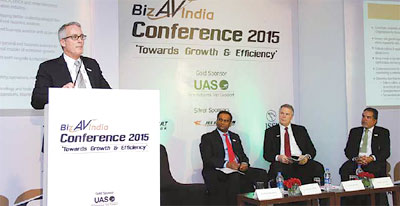BizAvIndia Conference - Time to think Small

Realising the neglect of the general and business aviation segment of the aviation sector, the Government of India is changing its focus and started thinking small (small aircraft), announced the Joint Secretary of Civil Aviation, G. Asok Kumar.
Inaugurating the ‘BizAvIndia Conference’, on the eve of Aero India 2015 in Bengaluru, Mr. Asok Kumar said the Government had formed a sub-committee in the Ministry of Civil Aviation to look into the concerns of the general aviation segment and the committee had putforth a number of points to the Union Finance Minister, Mr. Arun Jaitley on how aviation can be an engine of growth. A ‘course correction’ is taking place, he assured the industry.
FAA Downgrade to be revoked soon
The Joint Secretary listed out the initiatives that the government was taking, starting with getting the US FAA (Federal Aviation Authority) downgrade revoked. The Ministry is working on enhancing safety measures, though India had one of the best safety standards, and the FAA downgrade should be revoked soon.
Schedule Commuter Airlines
In the next few months, the government will be introducing a unique concept of Schedule Commuter Airlines not only to enhance regional and remote area connectivity, but also to encourage the general aviation sector to grow. The Ministry is working on revising the route dispersal guidelines (RDG) and this should be finalised soon. Under the plan is to have code share between scheduled operators (airlines) with non-scheduled operators (general and business aviation operators).
Cluster Approach
Mr. Asok Kumar said as ground handling charges at airports were high and the small operators were finding it difficult, there was a plan to have a group of non-scheduled operators (NSOPs) to have common maintenance facility. This would bring down costs.
International Perspective
The President and CEO of GAMA, Peter Bunce in his keynote address said the potential of the general and business aviation sector ‘is truly phenomenal’, but India need to set conditions right for its growth through proper policies, infrastructure creation etc.
The challenges were many including the perception that business aviation did not add value to the economy. This lack of understanding that it can add substantial value has to be driven home and it is happening. The impediments for the sector are: no coherent regulatory approach; punitive taxes and charges; lack of general aviation infrastructure; economic disincentives; poor airport access etc.
As regards MRO (maintenance, repair and overhaul) facilities, he said, India’s MRO market potential is $700 million and that presently 90 to 95 per cent of MRO work goes outside India. With regard to taxation, the government he hoped would realise that the tax revenues from the sector were minimal and that it would be better to encourage the industry with better tax structure. The import tax and CVD on aircraft in India were among the highest in the world.
Looking ahead, Mr. Bunce mentioned that regulation should be proportionate and it should align with global practices; focus on aviation safety and also align with national economic and fiscal regimes.
ISBAO benefits
The Director General of IBAC, Mr. Kurt Edwards talked about the benefits of implementing ISBAO (International Standards for Business Aviation Operations). There are 750 operators around the world and India had only one operator who was audited under IS BAO – that is SRC Aviation. The certificate was presented to SRC Aviation at the conference. Mr. Edwards said safety management systems would prevail all over the world sooner than later.
New Government, New Pace
In his welcome address, the President of Business Aviation Operators Association, Mr. Rohit Kapur said that the association has been growing steadily since it began in 2011. It now has 77 members and was filling a void in the industry.
Mr. Kapur said that with the new government coming in, there has been a new pace to development. “It is a positive change. We are confident soon enough, things will start changing.”
Aircraft Management operators
In a session on opportunities, Jayant Nadkarni, co-founder of Invision Air, said the concept of aircraft management would be the next thing in India. Presently, of the 120 non-scheduled operators, 110 are owners and operators themselves and many of them were unaware of aircraft management nuances.
The benefits of aircraft management concept, he said, were many including – readymade industry connectivity, flight department, SMS running etc; better planning – faster off the block and more efficient operations; economies of scale (lower insurance, maintenance); access to additional aircraft and additional crew; and de-risking and protecting owners.
The Secretary of BAOA, Group Capt. R.K.Bali spoke about ‘regional and remote air connectivity – the way forward’. There were sessions on MRO: unleashing the sector; environment and opportunities and helicopter operations.





